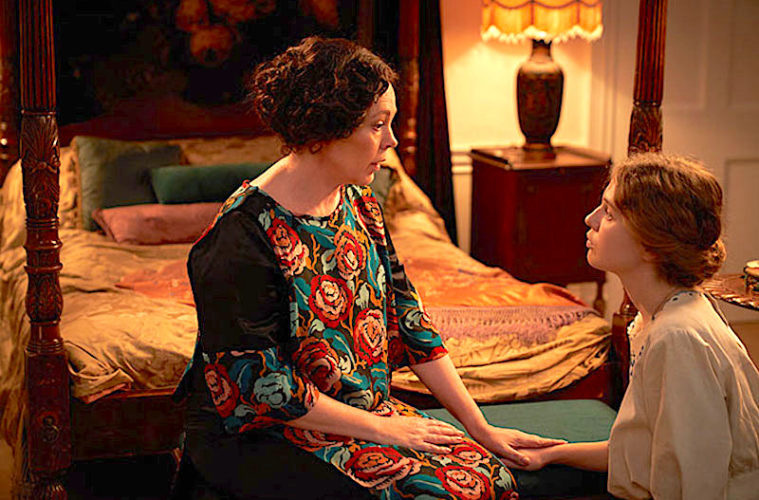 In small roles, Colin Firth and Olivia Colman, two masters of melancholy, bring emotional power to French director Eva Husson‘s sensual yet subdued adaptation of Graham Swift’s 2016 novel, Mothering Sunday.
In small roles, Colin Firth and Olivia Colman, two masters of melancholy, bring emotional power to French director Eva Husson‘s sensual yet subdued adaptation of Graham Swift’s 2016 novel, Mothering Sunday.
It is March 1924 and Jane (Odessa Young), housemaid to the Nivens (Firth and Colman), is preparing for a day of leisure. The Nivens are off to a traditional Mother’s Day outing with their neighbors, the Sherringhams (Craig Crosbie and Emily Woof), who, like them, lost sons in World War I. There are many grand houses in this beautiful Berkshire countryside and nearly all of them are suffused in mourning for sons lost in war. Jane, Swift writes in the novel, came to work for the Nivens just after “a great gust of devastation”.
Jane has a secret. On this day, she’ll bike to the Sherringham house to meet with the family’s surviving son, Paul (Josh O’Connor), with whom she’s been having an affair for several years. Jane and Paul know each other intimately but their assignations have been, by necessity, furtive and quick. Today, with everyone away, they’ll have the time and in the estate house, the space to experience something new: full nudity and a delicious post-coital languor. It will also be, most likely, their last meeting. Paul is about to marry.
Husson, screenwriter Alice Birch and the extraordinarily gifted Young and O’Connor, bring a compelling complexity to Jane and Paul’s encounter in Paul’s bedroom: they are experiencing each other fully for the first time but also, for the last time. Each glance, each touch, is fraught with heat and a building sense of loss. This is the golden afternoon of their lives and they know it.
It’s a sensual and fearless sequence. Husson and Birch embellish Swift’s marvelously honest depiction of the journey Jane and Paul have taken in dealing with the messiness of sex, from using birth control in an age when that was uncommon to dealing with the absurdities of semen and semen-stained sheets, a byproduct of lovemaking of which maids in fancy houses know more about than most. In the long scenes at Sherringham manor with Jane and Paul, which eventually find Jane exploring the house alone, in the nude, Mothering Sunday is a wonderfully free and frank film, the kind Americans don’t tend to make.
In the novel, Jane is an acclaimed novelist looking back on this day, but for the movie, Birch has created a layered time structure that expands Swift’s vision of Jane’s life to include a romance with Donald (Ṣọpẹ Dìrísù), an academic philosopher who encourages her to write about Paul. In flash forwards to the end of Jane’s life, Jane is played by Glenda Jackson, who is a perfect elder match to Young. This is Jackson’s first feature film role in 32 years. She’s in three brief scenes and brings to them a fullness of being that feels like she inhaled Young’s entire performance as young Jane, an impossibility, to be sure, and a measure of her genius. It’s a thrill beyond measure to have her back on our movie screens.
Mothering Sunday moves in fits and starts and might be too emotionally subdued for some. The film is always gorgeous but the slides forward into time don’t have the emotional resonance of the sequences in 1924 England when Firth and Colman reveal, with haunting precision, the depths of their pain at having lost their son in the war. For Colman (who delivered another unforgettable maternal turn in the Oscar-nominated The Lost Daughter), Birch has written astonishing dialogue in which she suggests that Jane is better off for having lost her mother at birth and gotten her “bereavement” out of the way right off. In the novel, and in the film too (in an unspoken, very subtle way), Jane wonders, “Could life be so cruel yet so bounteous at the same time?”
Advertising disclosure: We may receive compensation for some of the links in our stories. Thank you for supporting LA Weekly and our advertisers.

